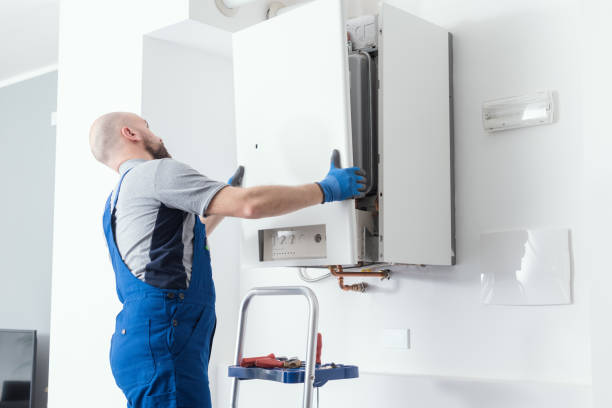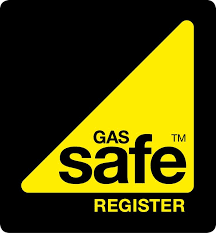As temperatures drop, we’re reminded of how much we rely on our heating systems to keep us warm and comfortable. If your boiler is old or inefficient, it may be time for a replacement. A new boiler installation is a big investment, but it’s worth it in the long run to have an efficient, reliable, and hassle-free heating system.
In this guide to new boiler installation, we’ll walk you through the process step by step, from choosing the right boiler for your home to finding a qualified installer and getting the best possible price. Whether you’re a homeowner or a landlord, this guide will help you make informed decisions and ensure that your new boiler installation is a success.

Signs that it’s time for a new boiler
A boiler is an essential part of any home’s heating system. It’s responsible for heating the water that flows through your home’s pipes and radiators. Over time, your boiler may start to show signs of wear and tear, and you should know when it’s time to replace it. One of the most common signs that it’s time for a new boiler is if your current boiler is more than 10 years old.
Older boilers tend to be less energy-efficient, which can result in higher energy bills. Another sign that it’s time for a new boiler is if you notice that your home is taking longer to heat up than it used to. This could be a sign that your boiler is no longer functioning properly and needs to be replaced. Additionally, if you notice any strange noises coming from your boiler, such as banging or clanking, it’s a good idea to have it inspected by a professional.
If your boiler is leaking or producing a strange smell, it’s time to call a professional plumber to inspect the boiler and determine if it needs to be replaced. By recognizing these signs, you can avoid potential breakdowns and ensure that your home is heated efficiently and safely.
Types of boilers and choosing the right one for your home
When it comes to choosing the right type of boiler for your home, there are a few things to consider. The first is the type of fuel that you want to use. The most common types of boilers are gas and oil-fired.
Gas boilers are often the most cost-effective option, but if you live in an area where gas is not available, then you may need to consider using oil.
Another factor to consider is the size of your home. The size of your boiler will depend on the size of your home and how many people live in it. If you have a large home, then you will need a larger boiler to ensure that it can heat your entire home. There are several types of boilers available, including combi boilers, conventional boilers, and system boilers.
A combi boiler is a high-efficiency water heater and central heating boiler combined. Conventional boilers, also known as regular boilers or heat-only boilers, require a hot water cylinder and cold water storage tank to operate. System boilers are similar to conventional boilers, but they do not require a cold water storage tank.
They are a good option for homes with limited space. Research the different types of boilers and consult with a professional to determine which type of boiler is right for your home.
Choosing the Right Boiler
Choosing the right boiler is a crucial decision when it comes to a new gas boiler domestic installation in the UK. With numerous options available in the market, it’s essential to consider various factors to ensure you select the most suitable boiler for your needs. Here are some key points to consider when choosing a new boiler.
Firstly, determining the correct size of the boiler is vital. A boiler that is too small may struggle to meet your heating demands, while an oversized boiler may lead to energy wastage and increased costs. Consulting a heating engineer or a qualified installer can help you determine the right size of the boiler based on factors such as the size of your property, insulation levels, and hot water usage.
Energy efficiency is another crucial factor. Opting for a high-efficiency boiler can significantly reduce your energy bills and environmental impact. Look for boilers with an ErP (Energy-related Products) rating of A or above. These boilers are designed to operate efficiently and effectively, helping you save money in the long run.
Consider the brand and reliability of the boiler. Choosing a reputable brand with a track record of reliability can give you peace of mind regarding the performance and longevity of your boiler. Look for boilers that come with extended warranties, as this indicates the manufacturer’s confidence in their product.
Lastly, take into account your budget and any additional features you may require. While it’s important to consider the upfront cost of the boiler, don’t forget to factor in long-term savings and benefits. Some boilers offer features like smart controls, which allow you to monitor and control your heating remotely, providing convenience and energy efficiency.
Finding a qualified installer
When it comes to installing a new boiler, make sure you find a qualified installer. This will ensure that the installation is done properly and safely. The first thing you should do is research different installers in your area. You can do this by asking for recommendations from friends or family members who have had a new boiler installed recently.
Alternatively, you can search online for local boiler installers and read reviews from previous customers. Once you have a few options in mind, it’s important to check that the installer is properly certified.
A qualified installer will have the necessary qualifications and certifications to carry out the installation. You can check this by looking for the Gas Safe register. These certifications are required by law in the UK, so if an installer doesn’t have them, it’s best to steer clear.

It’s also a good idea to get a few quotes from different installers to compare prices. While you don’t want to choose the cheapest option, you also don’t want to pay over the odds for the installation. A reputable installer will provide you with a detailed quote that includes all the necessary work, so you know exactly what you’re paying for.
By finding a qualified installer, you can have peace of mind that your new boiler installation will be hassle-free and provide you with reliable heating for years to come.
Preparing for Installation
When it comes to a new gas boiler domestic installation in the UK, proper preparation is key to ensure a smooth and successful installation process. By taking a few steps beforehand, you can help streamline the installation and minimize any potential disruptions. Here are some essential tips to prepare for your boiler installation.
Firstly, it’s crucial to choose a reputable and qualified heating engineer or installer for the job. Look for professionals who are Gas Safe registered, as this certification ensures they are legally qualified to work on gas appliances. A professional installer will guide you through the process, answer any questions you may have, and ensure compliance with safety regulations.
Before the installation day, clear the area where the new boiler will be installed. Remove any obstacles or belongings that might hinder the installer’s access to the boiler. This will allow them to work efficiently and complete the installation in a timely manner.
Consider informing your installer about any specific requirements or preferences you have regarding the boiler’s placement. They will assess the feasibility of your requests and provide expert advice on the most suitable location for optimal performance and convenience.
Ensure that the installer has access to the necessary utilities and facilities during the installation process. This includes access to gas, electricity, and water supplies. Clear any obstructions or provide relevant information regarding the location of utility connections to avoid delays or complications.
Discuss the timeline and logistics with your installer to have a clear understanding of the installation process. This will help you plan your schedule accordingly and make any necessary arrangements, such as taking time off work or arranging for alternative heating sources during the installation period
Tips for a successful and hassle-free installation
Getting a new boiler installed can be a big and often expensive task. You want to make sure that you get it right the first time and that the installation runs smoothly. Here are some tips to help you have a successful and hassle-free boiler installation:
- Choose the right installer: Make sure you hire a reputable installer who is registered with Gas Safe. You can ask for recommendations from friends and family or do your research online.
- Get a quote: Get a quote from the installer before the installation begins. This will give you a good idea of what you can expect to pay.
- Prepare the area: Make sure the area where the boiler will be installed is clean and clear of any obstacles. This will make it easier for the installer to work and can help prevent any damage to your home.
- Be patient: Installing a boiler takes time and can be a complex process. It is important to be patient and not rush the installer.
- Ask questions: You should always feel comfortable asking questions throughout the installation process. If you are unsure about anything, ask the installer for clarification. 6. Get a warranty: Make sure you get a warranty for your new boiler. This will give you peace of mind in case anything goes wrong after the installation.
By following these tips, you can have a successful and hassle-free boiler installation.
